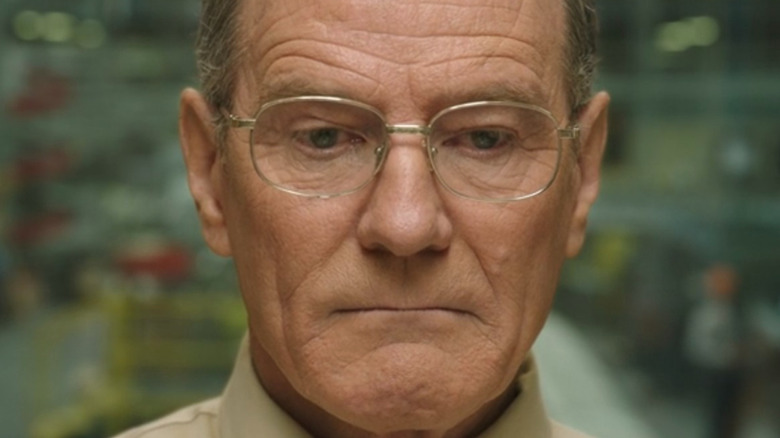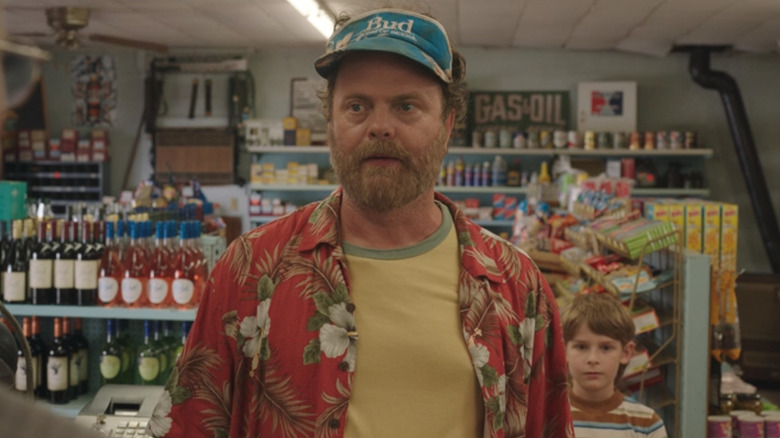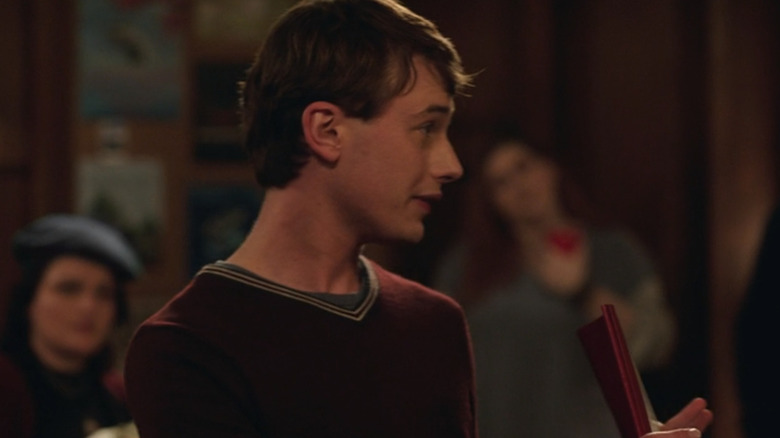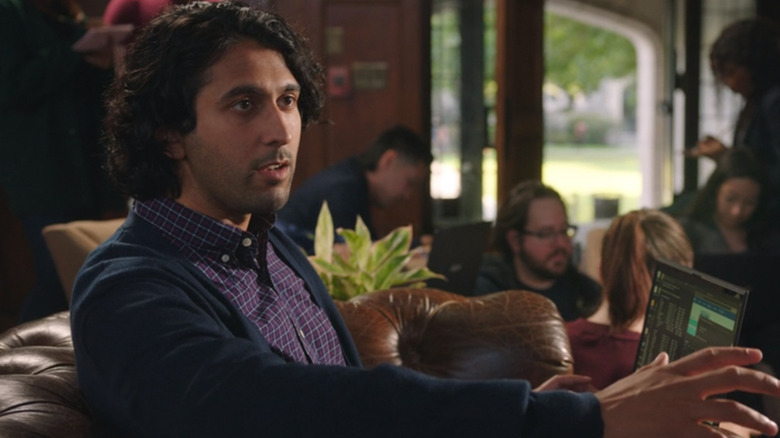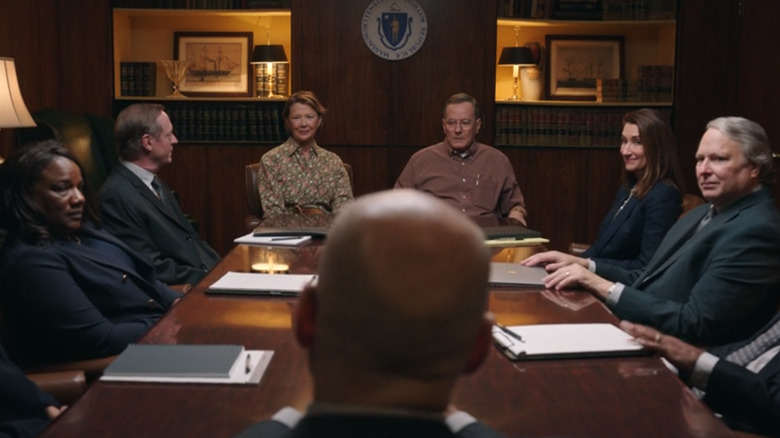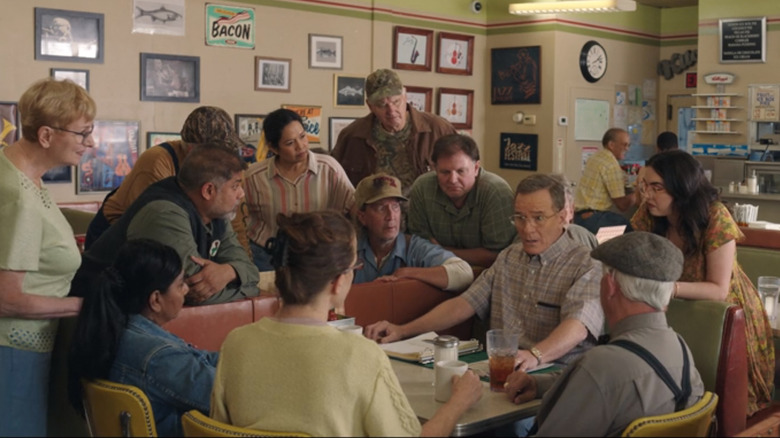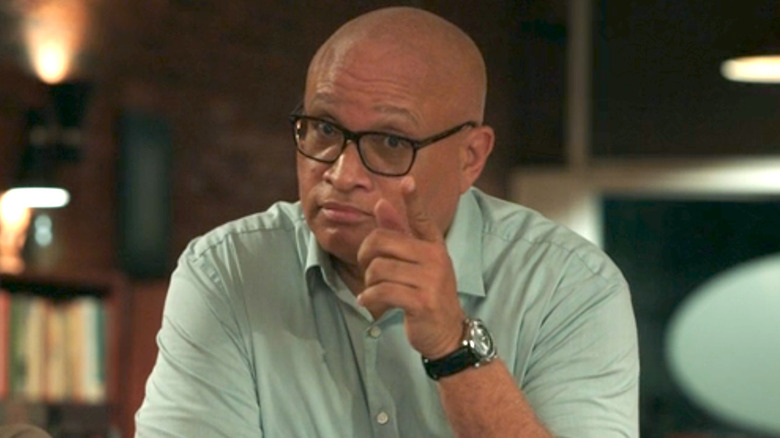The Ending Of Jerry And Marge Go Large Explained
"Jerry and Marge Go Large" hit Paramount+ on June 15 and has since struck a chord with its feel-good aura and gentle tone. It's the rea-life story of Jerry and Marge Selbee (Bryan Cranston and Annette Bening), a central Michigan couple who make nearly $27 million after discovering a loophole in a multi-state lottery game called Winfall. After Jerry retires from his job as a middle manager at a Kellogg's cereal plant, he figures out that when the game's jackpot hits $2 million it triggers a prize rolldown (per Insider), and odds shift to the player's favor.
Jerry loses a few hundred dollars in his first shot at the game, realizes he has to invest more to make a profit, and cleans out the couple's bank account for his next play without telling Marge. It's the only unlikable thing Cranston's character does in the entire film — he and Bening are delightful throughout in their mom jeans and white sneakers. Jerry hits big on his second try, and when he confesses to Marge, she is enthusiastically all in on the fun.
In an era where almost everything offered up for viewing is either a $200 million CGI extravaganza, has infinite timelines, or kills half its characters only to bring them back from the dead, it's refreshing to see a linear story in our familiar and natural universe that puts zero lives at stake. The straightforward innocence of "Jerry and Marge Go Large" is also the perfect delivery vehicle for some valuable life lessons.
Jerry and Marge aren't the only ones to take advantage of the game's quirk
When Michigan drops the game, Jerry and Marge start driving 10 hours to Massachusetts to play Winfall. There they befriend a convenience store owner named Bill (Rainn Wilson), who quickly joins the corporation Jerry and Marge have formed to boost their capital and their odds.
In certain moments, "Jerry and Marge Go Large" feels like a heist movie without the crime. In others, it plays like an anti-romantic comedy, where the couple comes closer by finding joy in the mundane instead of via some inscrutable and frustrating journey. But the milquetoast Bonnie and Clyde don't skate through the whole film without some conflict. Act II introduces villains Tyler (Uly Schlesinger) and Eric (Cheech Manohar), a couple of arrogant Harvard students who also find the loophole and start a betting group of their own.
Eric hacks into the state lottery system and finds out where Jerry and Marge's machine is located, and he and Tyler pay them a visit, interrupting the couple's anniversary celebration. The youngsters are ageist and obnoxious, but slink from the store after Marge slyly offers the boys a juice box for the road and Jerry embarasses Tyler with his superior mathematical skills.
The leaders of the two groups handle their conflict very differently
The rivalry between the two groups was embellished to bring conflict to the film, and its depiction is the furthest it deviates from the story of the real-life Jerry and Marge Selbee (per The Los Angeles Times). Tyler, who would fit in any 1990s high school or college movie as the stereotypically slimy bad guy, comes to Michigan and threatens to use Eric's hacking skills and his team's people power to run the lives of the folks in Jerry and Marge's corporation. The ever-pragmatic Jerry backs off and plans to quit the game — a contrast from Cranston's increasingly evil Walter White from "Breaking Bad," of course, who would have had the students murdered en masse and melted in vats of acid.
After Tyler's threat, it takes some prodding to keep Jerry in the game. His son Doug (Jake McDorman) tells him he is tired of seeing his father be "overlooked and pushed around. Nobody knew what you could do. Nobody cared, and then you finally took your shot and you brought us all with you ... you made our little town feel big." Marge's enthusiasm for the game feeds her determination, and over breakfast the next morning she inspires Jerry to keep playing, telling him "The one thing I have never seen you do is give up on a problem before you find a solution."
Jerry takes the high road at every turn, while Tyler is completely detestable
Eric's hacking skills again come in handy for the Harvard group when they are able to monitor the jackpot and trigger an early rolldown with a well-timed $1 million investment, but here Tyler's hubris costs him greatly. When he and Eric crashed their anniversary party, Tyler bragged to Jerry and Marge about the information they got from hacking the lottery commision servers. After missing out on the premature payday, Jerry immediately realizes how the students had manipulated that week's game.
Jerry hops in his truck and drives to Harvard to confront the team of twerps. He tells Tyler, "You think being the smartest guy in the room is all that matters, but it turns out it's this room that matters — all these bright young people helping you get rich. How are you helping them?"
The Selbees immediately and openly share their knowledge and wealth, and this selflessness is a large part of what makes "Jerry and Marge Go Large" so endearing. It's also both jarring and welcome when so much of what we see, fiction or nonfiction, is full of bad people doing bad things.
All good things must come to an end, including Winfall
Jerry realizes that the lottery commission is profiting from the two groups' massive plays and he and Marge pay the board a visit. The couple is able to convince them to publish the current jackpot size online and put two lottery machines in Bill's store so they can spend even more time together. But a Boston Globe story about the two groups prompts the commission to scuttle the game after one more drawing. The state also takes away Bill's ticket machine, and Jerry again decides to call it quits rather than scramble for one more big payout.
But his friends and family fill a bus and head to Massachusetts for one more windfall, surprising the couple with bins full of tickets ready for counting at the unveiling of the town's new jazz pavilion — which the game's largesse has more than paid for. The group apparently also has earned enough to bring in pop star Tori Kelly to serenade Jerry and Marge with the song he played for her on their anniversary, "Dream a Little Dream of Me."
A Rainn Wilson voiceover closes the film, announcing that the couple used most of their winnings to offer business loans to townsfolk — most of whom were also able to pay for their children or grandchildren's college educations. But "be kind and generous" is just one of many lessons to be learned from "Jerry and Marge Go Large."
The message of Jerry and Marge Go Large is wonderfully simple and sincere
Jerry's honesty and community-centered mindset bring little conflict to the film, but his peaceful kindness throughout is refreshing in an era of anti-heroes and heroes that become villains. He constantly keeps others' interests at heart and lifts them up alongside him, although he is unsuccessful in convincing Tyler to do the same. Jerry and Marge teach us that doing something small with the people we love can grow into something beautiful and far-reaching. They show us how to cherish the moments we have together, and to stay determined in the face of unexpected and intimidating obstacles.
Marge also offers a lesson in bravery and creative thinking, telling Jerry that Tyler has failed to realize that "as long as you and I have each other, we're not afraid to be stupid." Tyler's arrogance is also cautionary. Had he never bragged to Jerry that he and Eric hacked the lottery servers, his single-minded greed may have ultimately paid off. Eric is somewhat redeemed late in the film when he alerts Tyler that he's no longer willing to keep steamrolling other people to make money.
Director David Frankel believes the film's message is clear
Larry Wilmore, who plays Jerry and Marge's accountant Steve, recently hosted director David Frankel ("The Devil Wears Prada") on his podcast, "Black on the Air." Frankel said the message to seize what moments we have with loved ones was intentional. "You think you always have time, and then somewhere along the way, you know, your friends start kicking it," he said. "If you're wise and lucky, you reorient yourself a little bit, and you do find something new ... and maybe, as Jerry and Marge do, you get a new adventure."
On one level, "Jerry and Marge Go Large" may be a game of tic-tac-toe in a world of 12-level chess, but at the same time, the film's simplicity hides a road map to a peace of mind that has lately become harder and harder to achieve. The film clearly wants us to find some adventures in kindness and clearly points the way for us to get there. So, maybe after watching, it's a good time to pet a dog, love your neighbor, and try to be the best Jerry and Marge that you can possibly be.
